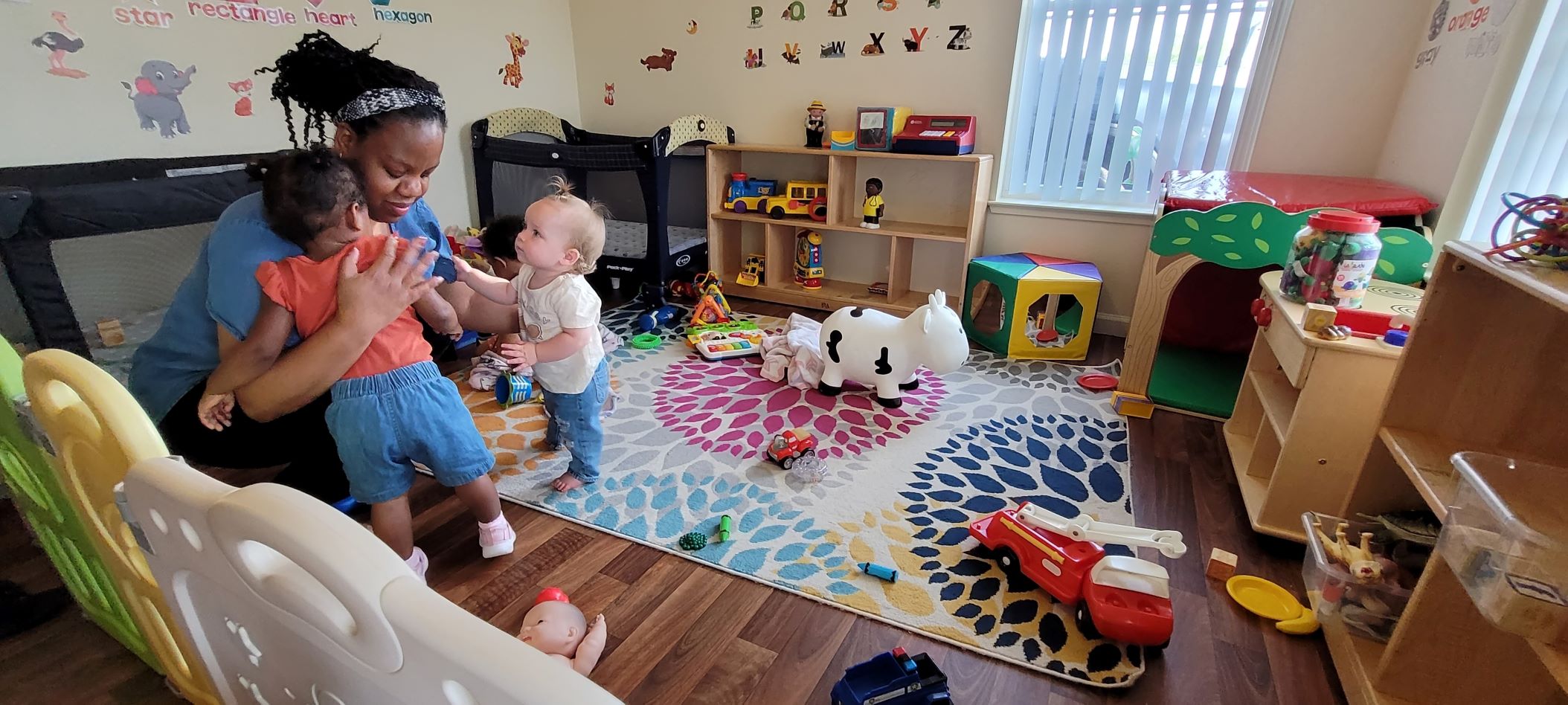
Kim Stephens, a Family Child Care provider, cares for two toddlers and an infant in her Fort Drum home. She began her career nearly three years ago, and, while her family is moving soon to their next duty station, she said the transition from one FCC program to another is a smooth one. The Fort Drum FCC program, which falls under Child and Youth Services, provides child care options in government housing on post. (Photo by Mike Strasser, Fort Drum Garrison Public Affairs)
Family Child Care providers open their homes for high-quality child care on Fort Drum
Mike Strasser
Fort Drum Garrison Public Affairs
FORT DRUM, N.Y. (June 28, 2022) – More Army spouses at Fort Drum are making child care a career choice – providing quality, reliable care while creating a home-away-from-home environment for military children.
Fort Drum Child and Youth Services’ Family Child Care (FCC) providers care for approximately 70 children on post, and while the number fluctuates, it is bound to grow this year. A 15th provider recently completed her certification, while two more are in the application process.
That’s good news, said Jennifer Wood, FCC program manager, because she remembers when it wasn’t always that way.
When she transitioned to her current position in March 2021, there were only three FCC providers available – a number that she attributed mostly to pandemic concerns. Before that, the number of FCC homes averaged between six and 10 annually.
“It’s not just Fort Drum, you see that everywhere,” Wood said. “There’s always a demand for more child care, both on post and off post. So we encourage spouses to consider a career in home care, look at the program we have and see if it is a good fit.”
But if the present surge in families opening their homes for child care at Fort Drum can be explained, Wood said the credit goes to the providers who are sharing their experience with other spouses.
“I truly believe it’s all because of this group of providers who are getting the word out,” she said. “Sometimes its sharing information about the program in chat groups, or they can be at the park and have a conversation with another spouse – ‘have you ever thought about becoming an FCC provider?’”
“I really give all the credit to them,” Wood added. “I have a great group. They love the program, and they enjoy what they are doing.”
Wood said that when a family member expresses interest in becoming a provider, she responds with informational material and advice to help them make an informed decision with their family. She said there is a lot to be considered before starting a home business, which she reviews with the applicant during the initial interview.
“This is a way they can earn an income taking in other children while spending more time with their own families, which helps out other families at Fort Drum,” she said.
FCC candidates complete the same two-week training curriculum as program assistants at child development centers on post. This includes CPR and first aid, food handling, lesson plans and teaching strategies. Providers also enroll in online training, with 18 months to finish 13 modules on topics ranging from child abuse prevention, nutrition, and creating safe environments. All of the training is free, and Wood said that modules are transferable for college credits.
While training ensures the provider is ready, the next step is making sure the home is ready for child care. Caregivers have access to a well-stocked lending resource library, with shelves filled with toys, books, teaching supplies, gym mats, cribs and more. Personnel from the Fort Drum Fire and Emergency Services, Safety Office, Environmental Division and the Army Public Health Nursing conduct home inspections. Then there are quarterly inspections, including a visit from a CYS nutritionist.
Wood, a North Country native, said that she started working at the Fort Drum CYS as a program assistant at a child development center, having had experience providing home care. It was her first time on a military post, and she found the process thorough, if not a little daunting.
“The Army is all about the training,” she said. “There’s just so much they throw at you. So once you get through all the paperwork and the training, you feel very prepared and you know exactly what is expected of you.”
Providers can opt for full-time, part-time and hourly care, as well as services to include weekend, evening and overnight care, as well as care for newborns and children with special needs. They can care for one child or as many as six at a time (only two can be 2 or younger).
Kim Stephens learned about the FCC program from her husband while they were stationed at Schofield Barracks, Hawaii.
“Sometimes space is limited in day care, especially during PCS (permanent-change-of-station) season with everyone moving in or leaving, so he brought it to my attention – the idea of becoming a day care provider,” she said. “It was something I could do while being home with my own kids, which I think is a great opportunity.”
It was the little things, like being able to put her two daughters on the school bus and being there when they returned, that helped convince her that working from home would be ideal for her family.
“That, and knowing I could be of help to other spouses who want to work outside of their home,” Stephens said. “When you choose to become a provider, you have to discuss this with your family, just to make sure that everyone understands what’s to come and knows the process involved. My family was all in.”
Stephens also was able to teach her son alongside the other children for whom she was caring.
“By the time he got in kindergarten, I was able to help him read and do math,” she said. “Now he loves school, and it was because of that school environment we have at home.”
Stephens said that she often sends parents pictures of what their children are doing throughout the day to ease their minds and help keep them connected.
“Parents do like to see photos and get updates of their children, especially the younger ones,” she said. “So I will take pictures during mealtime or playtime that I will send to the parents daily or a few times a week.”
It is also a way to keep track of milestones, like a toddler’s progress from crawling to walking. For holidays, Stephens will have arts and crafts projects for the children to take home, like a Happy Father’s Day card.
“The parents will also send me pictures, which is so great,” she said. “We do become like family.”
When her family moved to Fort Drum, Stephens transitioned from multi-age care to infants and toddlers, because all of her children were in school.
“I changed from multi-age group to infants because my son was in school fulltime and the wait list for infants was tremendous,” Stephens said. “Other provider homes were multi-age group, so we thought it was a good idea to be an infant home since I have years of experience and I could be more helpful this way. It worked out.”
Stephens said that her family has always been supportive of the work environment she created at home.
“They do help me at the end of the day, and on weekends, with the cleaning and sanitizing toys,” she said. “When we have toddlers here, we do that daily because they touch everything. Everyone is involved.”
“When I close up at 5:30, then we go right into dinnertime and family time, then we clean up and they help me reset for the next morning,” Stephens added. “It’s like a family business.”
Her family will be moving this summer to Fort Leavenworth, Kansas, but Stephens said that she will be able to restart child care service within a couple of months.
“They make it pretty easy and convenient, especially considering how often we may have to move,” she said. “It’s one less thing to worry about – wondering where you are going to work when you go to a new place.”
Stephens said it can be bittersweet parting ways with children and families they have become accustomed to seeing every day.
“It is so sad when I have to close, because we’ve become so attached to the kids,” she said. “They’re like my own babies. My own kids get attached to them, especially my daughters.”
Wood said that interviews are scheduled so that the family can meet another provider who has space in that age group.
“We try to organize it so no one is left without care,” she said.
Stephens said that new providers benefit from job shadowing to see how other spouses set up their homes for day care and how they interact with the children.
“The advice I have for new providers is to take your time, because you can become overwhelmed if you try to take on too much at once,” she said. “And it’s important to consider your own children’s needs, and your whole family, with the families you are adding to your day care.”
Stephens said it is also helpful to schedule personal time in the evening or weekends, have a hobby or some other way to decompress from work.
“Do something for yourself,” she said.
Stephens said that she managed to carve out time while stationed in Hawaii to take online classes and earn her degree in business administration.
“That worked out great for me,” she said. “I know a lot of spouses are still in school, so they should know they can still earn their degree while caring for children.”
Col. James Zacchino Jr., Fort Drum garrison commander, recently visited her home for a routine inspection, but also to thank Stephens for being an FCC provider.
“What you do is very important to us, and I know the community appreciates it,” he said, while presenting Stephens with a garrison coin.
Zacchino said that he wanted to express his gratitude to FCC providers on post because of how successful they have made the program in the community.
“It’s not like this at every place we go, and I was impressed to hear how many providers are working at Fort Drum,” he said. “It’s the providers who I find most impressive, though, because they love what they do and they have a passion for what they do. In essence, they create a smaller version of a child development center inside their homes.”
He said what the Fort Drum FCC program is providing ties directly into the readiness of the 10th Mountain Division (LI).
“Soldiers have to be ready to fight and win our nation’s wars, and that doesn’t happen if their families aren’t supported and taken care of,” Zacchino said. “Soldier readiness is family readiness. I could not be prouder of what is happening here in the Fort Drum community – families taking care of families.”
To learn more about the Army Family Child Care program at Fort Drum, call (315) 772-2250 or visit https://drum.armymwr.com/programs/family-child-care. Those interested in beginning the certification process can download the application at www.armymwr.com/programs-and-services/cys/family-child-care-homes.





